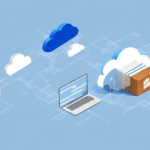Why UPS Doesn't Offer a SaaS Version of WorldShip
Shipping logistics are a vital component of any business that deals with physical goods. As technology continues to advance, businesses require increasingly sophisticated tools to manage their logistics efficiently. One such tool is UPS's WorldShip software. However, there has been widespread demand for a Software-as-a-Service (SaaS) version of WorldShip, which would provide greater flexibility and accessibility. This article explores why UPS hasn't developed a SaaS version of WorldShip and examines the importance of SaaS in the logistics industry.
The Role of SaaS in the Logistics Industry
The logistics industry is rapidly evolving, with SaaS-based solutions emerging as a prominent trend. SaaS allows businesses to access software over the internet, facilitating easier scalability and cost reduction. Implementing a SaaS solution offers numerous benefits, including:
- Lower Upfront Costs: Eliminates the need for significant hardware investments.
- Flexible Licensing Models: Adapts to business growth and seasonal fluctuations.
- Automatic Updates: Ensures software remains up-to-date without user intervention.
In the logistics sector, SaaS solutions such as transportation management systems, warehouse management systems, and supply chain visibility tools have proven successful. According to a Gartner report, SaaS adoption in logistics is projected to grow significantly, highlighting the importance of cloud-based solutions in enhancing operational efficiency and flexibility.
Understanding UPS WorldShip and Its Features
UPS WorldShip is a comprehensive shipping software designed to streamline the logistics operations of businesses. Its key features include:
- Shipment Processing: Facilitates the creation and management of shipments.
- Label Printing: Enables the printing of shipping labels with ease.
- UPS Tracking: Provides real-time tracking of packages.
- Address Validation: Ensures accurate delivery by validating addresses.
- International Shipping: Supports cross-border shipping with necessary documentation.
- Hazardous Materials Management: Assists in handling and shipping hazardous materials safely.
These features allow businesses to automate workflows, reduce manual entry errors, and gain valuable analytics to inform strategic decisions. Importantly, WorldShip integrates with other business systems, such as inventory management and accounting software, facilitating seamless data flow and operational coherence.
Current Limitations of UPS WorldShip
Despite its robust feature set, WorldShip has several limitations that may hinder its usability for some businesses:
- On-Premise Requirement: WorldShip needs to be installed on a specific computer, limiting accessibility for businesses with multiple locations.
- Maintenance and Updates: Regular software updates and maintenance can be time-consuming and may require technical expertise, posing challenges for smaller businesses.
- Limited Integration: WorldShip does not seamlessly integrate with all e-commerce platforms, potentially limiting its functionality for businesses using niche or proprietary systems.
- User Interface Complexity: New users may find the interface confusing, necessitating additional training and support.
- Advanced Reporting: The software lacks advanced reporting features, which can be a drawback for businesses seeking in-depth analysis of their shipping data.
Advantages of a SaaS-Based WorldShip
A SaaS version of WorldShip could address many of the current limitations by offering several advantages:
- Accessibility: Being cloud-based would allow users to access WorldShip from any location with internet connectivity, facilitating use across multiple offices and for remote workers.
- Scalability: Businesses could easily scale their usage based on demand without the need for additional hardware or licenses.
- Cost Efficiency: SaaS models typically follow a subscription-based pricing structure, reducing the need for large upfront investments in software licenses and hardware.
- Automatic Updates: The service provider would handle updates and maintenance, ensuring that the software remains up-to-date without user intervention.
- Enhanced Security: Cloud providers often offer robust security measures, including encryption, two-factor authentication, and regular security audits, to protect sensitive data.
These benefits align with the growing demand for flexible and cost-effective logistics solutions, potentially making a SaaS version of WorldShip highly attractive to businesses.
UPS’s Perspective on SaaS Solutions in Logistics
UPS acknowledges the increasing demand for SaaS-based solutions in the logistics sector. However, the company has focused on enhancing the current iteration of WorldShip rather than transitioning it to a cloud-based model. UPS emphasizes the importance of customer feedback and is continually assessing the feasibility and necessity of a SaaS version.
In addition to WorldShip, UPS has incorporated other SaaS solutions within its operations. For instance, UPS offers UPS My Choice for Business, a web-based platform that provides shipment tracking and management capabilities, illustrating UPS’s commitment to cloud-based services.
Comparing SaaS-Based and Traditional Shipping Solutions
When choosing between SaaS-based and traditional shipping solutions, businesses should consider various factors:
Cost
SaaS solutions typically involve lower upfront costs with subscription-based pricing, making them accessible for businesses of all sizes. Traditional solutions may require substantial initial investments in software licenses and hardware.
Scalability
SaaS platforms offer greater scalability, allowing businesses to adjust their usage based on changing needs without significant additional costs. Traditional software may require purchasing additional licenses or hardware to scale.
Maintenance and Updates
SaaS providers handle maintenance and updates, reducing the burden on internal IT teams. Traditional software often requires manual updates, which can be resource-intensive.
Integration and Flexibility
SaaS solutions generally offer easier integration with other cloud-based tools and services, enhancing overall flexibility. Traditional software may face limitations in integration capabilities, especially with modern cloud-based applications.
Overall, while traditional shipping solutions may suffice for larger enterprises with complex requirements, SaaS-based options offer advantages in flexibility, cost, and ease of use, making them particularly beneficial for small to medium-sized businesses.
Security Considerations in Cloud-Based Logistics Solutions
Security remains a crucial concern for businesses adopting cloud-based logistics solutions. However, reputable SaaS providers implement comprehensive security measures to protect data:
- Data Encryption: Both data at rest and in transit are encrypted to prevent unauthorized access.
- Access Controls: Role-based access controls ensure that only authorized personnel can access sensitive information.
- Regular Security Audits: Continuous monitoring and periodic security audits help identify and mitigate potential vulnerabilities.
- Compliance Standards: Adherence to industry standards and regulations, such as GDPR and ISO 27001, ensures robust data governance.
In some cases, cloud-based solutions may offer superior security compared to on-premise systems, as cloud providers invest heavily in security infrastructure and expertise that individual businesses may lack.
Potential Cost Savings and ROI with a SaaS Version of WorldShip
Adopting a SaaS version of WorldShip could yield significant cost savings and a favorable return on investment (ROI) for businesses:
- Reduced Capital Expenditure: Eliminating the need for purchasing hardware and managing on-premise servers lowers capital expenses.
- Operational Efficiency: Automation features reduce manual work, decreasing labor costs and minimizing errors.
- Flexible Pricing: Pay-as-you-go subscription models allow businesses to optimize spending based on actual usage.
- Improved Decision-Making: Access to real-time analytics and data-driven insights helps businesses optimize their logistics operations, leading to cost reductions and enhanced profitability.
According to a study by Forrester, businesses implementing SaaS-based logistics solutions can achieve up to 60% cost savings compared to traditional systems, highlighting the financial benefits of transitioning to a cloud-based model.
Competitors Offering SaaS-Based Shipping Solutions
While UPS has not yet developed a SaaS version of WorldShip, other companies in the shipping software market have embraced cloud-based models:
- ShipStation: A popular SaaS shipping solution that offers features like label printing, order management, and integrations with multiple e-commerce platforms.
- EasyPost: Provides a comprehensive API for shipping that integrates with various online platforms and carriers, offering scalable solutions for businesses of all sizes.
These competitors demonstrate the viability and demand for SaaS-based shipping solutions, potentially increasing pressure on UPS to innovate and offer similar cloud-based services in the future.
Benefits for Small Businesses with a SaaS-Based WorldShip
Small businesses stand to gain significantly from a SaaS-based WorldShip solution:
- Affordability: Lower initial costs make advanced shipping software accessible to businesses with limited budgets.
- Ease of Use: User-friendly interfaces reduce the learning curve, enabling businesses to implement the software quickly.
- Flexibility: Subscription models allow businesses to scale their usage in line with growth and seasonal demands.
- Remote Access: Cloud-based access facilitates operations across multiple locations and supports remote workforces.
- Enhanced Efficiency: Automation of shipping tasks reduces manual labor and errors, allowing small businesses to operate more efficiently.
By leveraging a SaaS-based WorldShip, small businesses can enhance their shipping operations, reduce costs, and remain competitive in a challenging market landscape.
Conclusion
While UPS WorldShip remains a robust on-premise shipping solution, the demand for a SaaS version highlights a significant opportunity in the logistics software market. SaaS-based solutions offer enhanced flexibility, cost-efficiency, and scalability that align with the evolving needs of modern businesses. Although UPS has yet to transition WorldShip to a SaaS model, the company's ongoing evaluation of customer feedback and industry trends suggests that a cloud-based iteration may be on the horizon. In the meantime, businesses seeking flexible shipping solutions may explore alternative SaaS options available in the market to meet their logistics needs effectively.






















